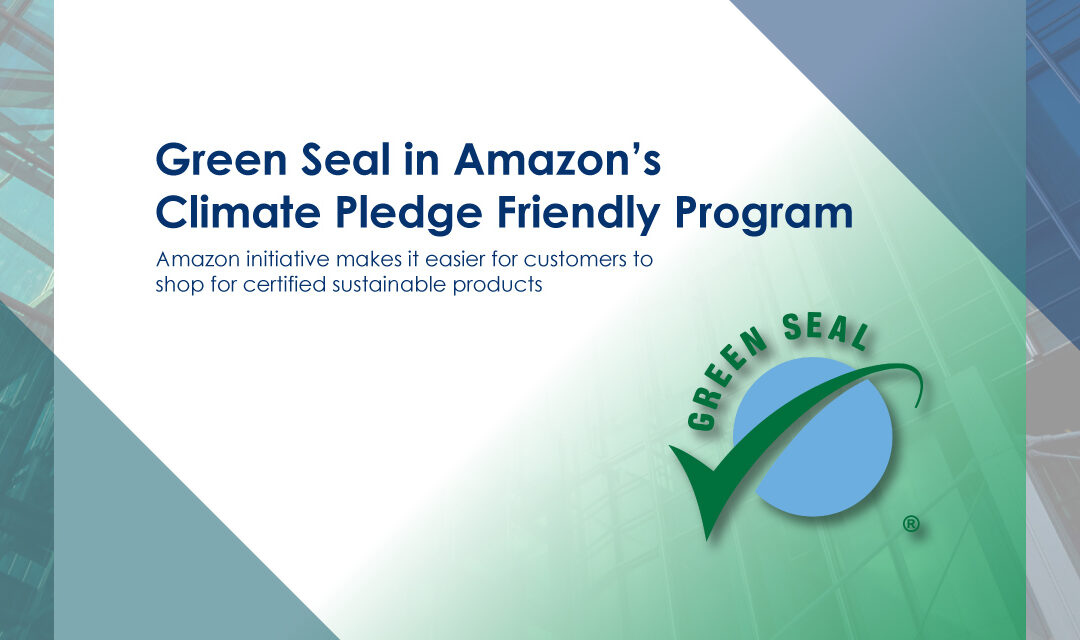
Oct 7, 2020 | Articles, Homepage
Amazon initiative makes it easier for customers to shop for certified sustainable products
Green Seal continues to build upon its relationships by participating in Amazon’s Climate Pledge Friendly, a new program that makes it easier for customers to discover and shop for more sustainable products.
Amazon customers will now see a “Climate Pledge Friendly” label on the listings for products certified by Green Seal and other select organizations, indicating to shoppers that the products meet meaningful sustainability standards. Customers can also see which certifications the product has earned and learn more about the certification requirements.
Amazon evaluated hundreds of external sustainability certifications for its Climate Pledge Friendly program and chose organizations that certify products that have demonstrated sustainability benefits. Green Seal’s science-based certification standards emphasize health and safety, prohibiting carcinogens, mutagens, and reproductive toxins in certified products and requiring a rigorous examination of a product’s sustainability in areas including raw materials extraction, manufacturing, packaging and how the product is used and disposed. Critically, Green Seal’s testing requirements mean that certified products are proven to deliver uncompromising performance.
“Amazon’s Climate Pledge Friendly label makes it simple for shoppers to identify which products are in line with their sustainability values,” said Green Seal CEO Doug Gatlin. “Amazon’s high bar for choosing certifying partners aligns with Green Seal’s commitment to recognizing products that meet the highest benchmark of health and environmental leadership. Green Seal is proud to take part in this powerful initiative. Amazon is demonstrating true leadership by making it easier for customers to shop for more sustainable products and encouraging brands and manufacturers to produce and source more sustainably.”
Amazon’s selection for Climate Pledge Friendly includes grocery, household, fashion, beauty and personal electronics products, as well as other items from a range of categories. Hundreds of Green Seal-certified products are available from brands such as Georgia-Pacific, Office Depot, Rubbermaid, 3M, Ecolab, Diversey, Staples, Kittrich, Branch Creek, Tork, Simoniz, Neenah, Betco and PortionPac, among others.
For detailed information on the pledge qualification criteria visit Amazon Climate Pledge Friendly. Look for the Climate Pledge Friendly badge on products.
About Green Seal
Green Seal is a global nonprofit organization with a mission to transform the economy for a healthier, greener world. Since 1989, Green Seal has applied rigorous standards for health, environmental sustainability and product performance to its certification programs to empower better purchasing decisions. Green Seal has certified thousands of products, services and spaces from hundreds of leading companies including 3M, Ecolab, Georgia Pacific, Hilton, Westin, Marriott and Staples, and is specified by countless schools, government agencies, businesses and institutions. Today, the Green Seal certification mark is a universal symbol that a product or service meets the highest benchmark of health and environmental leadership.
Visit GreenSeal.org or connect with Green Seal on Facebook, Twitter, and LinkedIn.
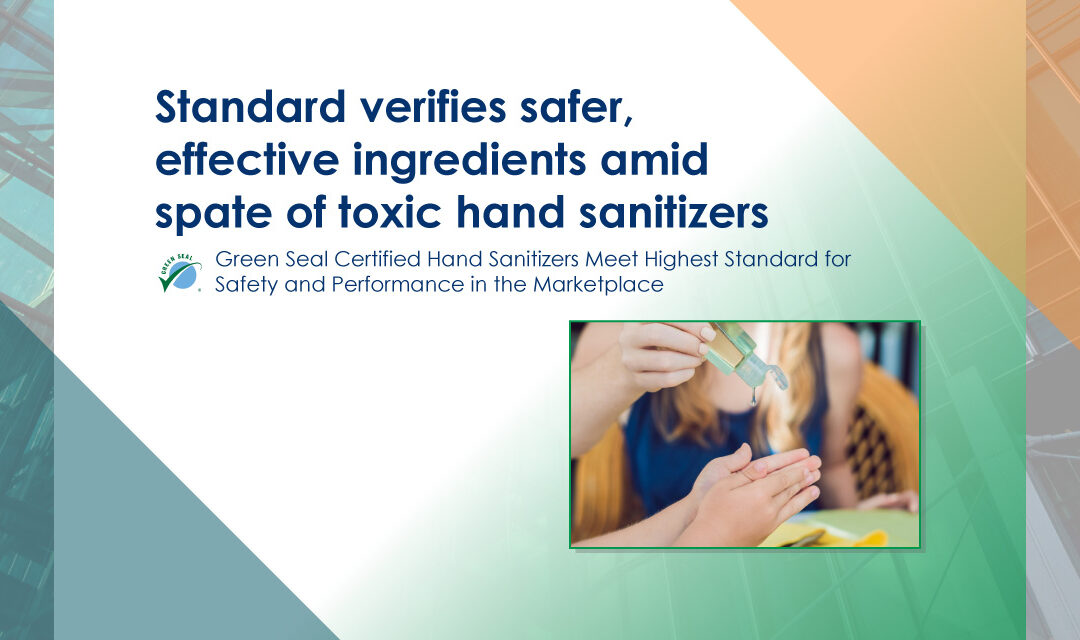
Sep 29, 2020 | Articles, Homepage
Standard verifies safer, effective ingredients amid spate of toxic hand sanitizers
Green Seal, the nation’s leading non-profit authority on safer and more sustainable cleaning and facility care products, is now certifying alcohol-based hand sanitizers that meet the highest standard for health and safety in the marketplace amid growing consumer concern about toxic products.
With the COVID-19 pandemic spurring many first-time producers to enter the market, the FDA has warned consumers to avoid more than 200 hand sanitizer products because of incorrect formulations and high levels of hazardous ingredients including methanol (wood alcohol) and the contaminant 1-propanol. Meanwhile, even when properly formulated, hand sanitizers available on the U.S. market can include hazardous ingredients linked to cancer, allergies, skin and eye irritation and other harmful health effects – even if they have an ecolabel.
Green Seal’s new hand sanitizer certification standard, created with input from public health and industry experts, screens 100% of the product formula for carcinogens, reproductive toxins, skin irritants, phthalates, parabens and contaminants. All Green Seal-certified products must meet strict performance testing requirements to ensure effectiveness.
“There is a critical market gap right now where buyers know to beware of toxic or ineffective hand sanitizers but are hard-pressed to quickly and easily identify safer options,” said Green Seal CEO Doug Gatlin. “Green Seal certification gives consumers, purchasers and facility managers confidence that they are buying a hand sanitizer that has been independently verified to the highest standard for health, safety and effectiveness.”
Standards
Independent verification by a trusted authority
Green Seal’s hand sanitizer certification standard is the non-profit’s latest initiative to harness its expertise to provide products, services and guidance that help protect people from both COVID-19 and negative health impacts from toxic chemicals.
- Green Seal Guidelines for Safer Cleaning and Disinfection for schools and workplaces have been adopted by commercial cleaning companies servicing more than 1 billion square feet of space.
- SEIU 32BJ, the largest union of property service workers in the U.S., has partnered with Green Seal on COVID-19 training for its members.
- More than 30,000 Green Seal certified products are used in offices, schools and homes each day, including cleaning products and hand soaps critical to de-contaminating buildings and protecting people.
To learn more about Green Seal’s hand sanitizer leadership standard and Green Seal-certified products, visit www.greenseal.org/hand-sanitizer.
About Green Seal
Green Seal is a global nonprofit organization that pioneered the ecolabeling movement with a mission to transform the economy for a healthier, greener world. Green Seal’s rigorous standards for health, sustainability and product performance have driven permanent shifts in the marketplace, empowering better purchasing decisions and rewarding industry innovators.
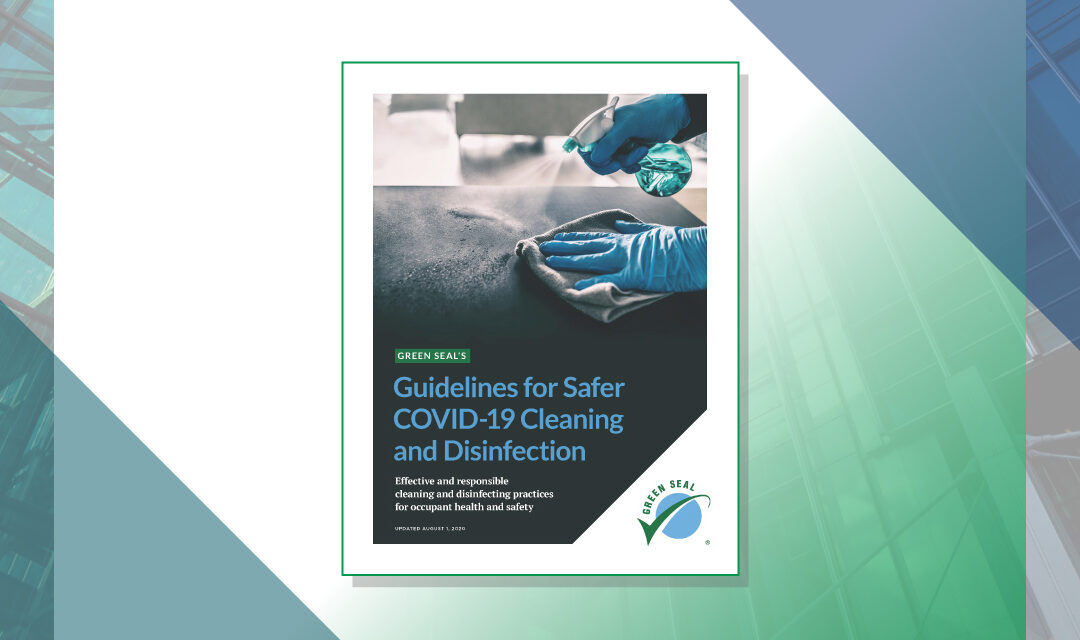
Sep 24, 2020 | Articles, Homepage
As part of Corporate Sustainability Strategies’ commitment to a sustainable future, President & CEO, Brenna Walraven serves as a member of Green Seal’s Board of Directors.
Recently, Green Seal launched its Safer COVID-19 Disinfection Guidelines to provide actionable best practices for effective and responsible cleaning and disinfection.
These Guidelines are covered extensively by several relevant publications (below) and tie in with growing concern about the health risks of overusing disinfectants, as outlined in the Bloomberg article Rush to Disinfect Offices Has Some Environmental Health Experts Worried.
Green Seal’s Guidelines for Safer COVID-19 Cleaning and Disinfection are intended for facility, property, and housekeeping managers. They provide actionable guidelines for the safe and effective cleaning and disinfection of occupied spaces and are based on the latest scientific understanding of the particular characteristics of the COVID-19 virus. They also reflect Green Seal’s expertise in setting science-based standards for high-performance cleaning products, principles, and practices that reduce unnecessary use of hazardous chemicals and promote safer and healthier indoor air.
From the Front Lines: Cleaning for COVID-19
About Green Seal
Green Seal is a global nonprofit organization that pioneered the ecolabeling movement with a mission to transform the economy for a healthier, greener world. Green Seal’s rigorous standards for health, sustainability and product performance have driven permanent shifts in the marketplace, empowering better purchasing decisions and rewarding industry innovators.
Relevant Publication Coverage
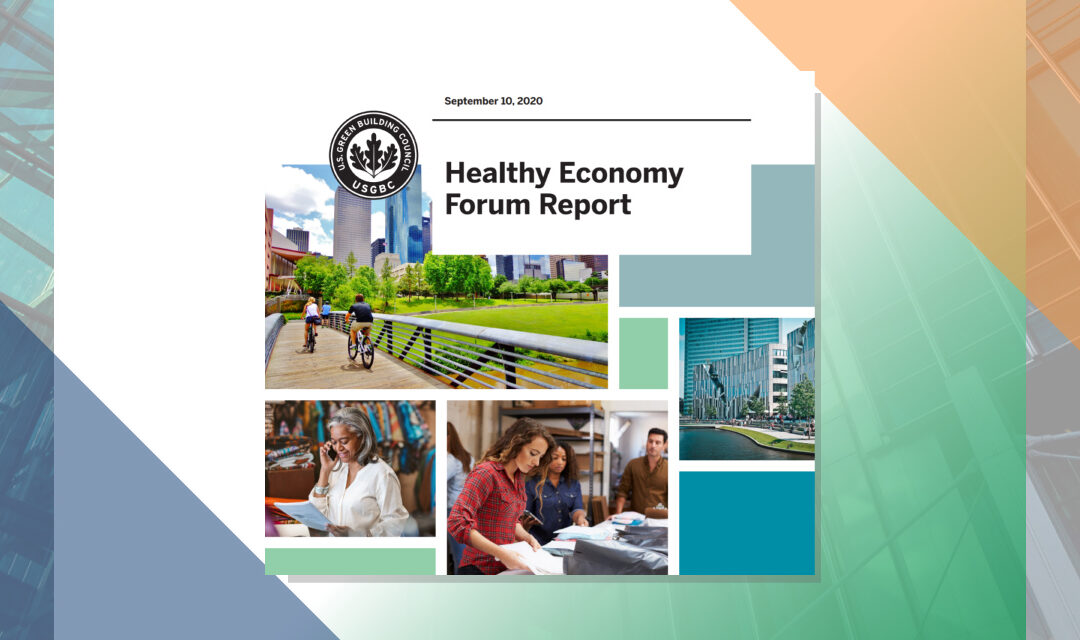
Sep 14, 2020 | Articles, Homepage
USGBC’s recently announced economic recovery strategy and vision, Healthy People in Healthy Places equals a Healthy Economy, articulates the interconnected role buildings and communities play in people’s health and the economy at large.
To make this strategy actionable, USGBC’s Healthy Economy Forum, held August 4-5, 2020, convened industry experts and frontline practitioners to provide insights and strategies for making our spaces healthier and more resilient.
At the forum, Brenna Walraven, President and CEO of Corporate Sustainability Strategies, together with Simon Turner, Owner and Founder of Building Cognition, Henry Chamberlain, President and Chief Operating Officer of BOMA International, Ben Myers, Vice President of Sustainability of Boston Properties, and Alex Spilger, Senior Vice President, Director of Sustainability of Cushman & Wakefield presented The Business Case for Healthy Buildings in a Post-COVID Era.
Notable references in the report include:
Indoor Air Quality (IAQ)
- Simon Turner, Owner and Founder of Building Cognition, noted productivity is highest when room temperature is set to 70-73 degrees and proposed building occupants will start to demand better ventilation with an increased cost of $14-$40 per person each year.
- Technology can play a key role in building trust. As Brenna Walraven, President and CEO of Corporate Sustainability Strategies, said, “There is an app for everything, and that includes indoor air quality.”
Active Design
- According to Walraven, inactivity results in $54 billion in health care costs and $14 billion in lost productivity.
Resiliency – Intersectionality
- Boston Properties’ Sustainability Program approaches this definition from an intersectional lens, combining climate action, resilience and social good, while prioritizing human health. This approach has been and continues to be shaped by watershed moments, whether it be the 2012 Superstorm Sandy to this year’s pandemic.
- Ben Myers, Vice President of Sustainability at Boston Properties, explained how they convened thought leaders and specialists to develop a plan of action for four phases of these events: retreat, return, restore and resilient. Grounded in science, their plan lays out five durable changes: physical distancing enablement, contact transmission elimination, IAQ management and expertise advancement (engineering expertise, monitoring mechanisms), cleaning and disinfection enhancement and shared responsibility and discipline for mitigation and containment (health screening, communication, testing, etc.).
Technology
- Henry Chamberlain, President and Chief Operating Officer, BOMA International, spoke about the use of sensors and cleaning, touchless or hands-free workplaces and virtual technologies as the new normal.
The Report summarizes the forum’s discussion and is the first step to a longer roadmap for the implementation of our healthy places for a healthy economy vision.
Full Healthy Economy Forum Report
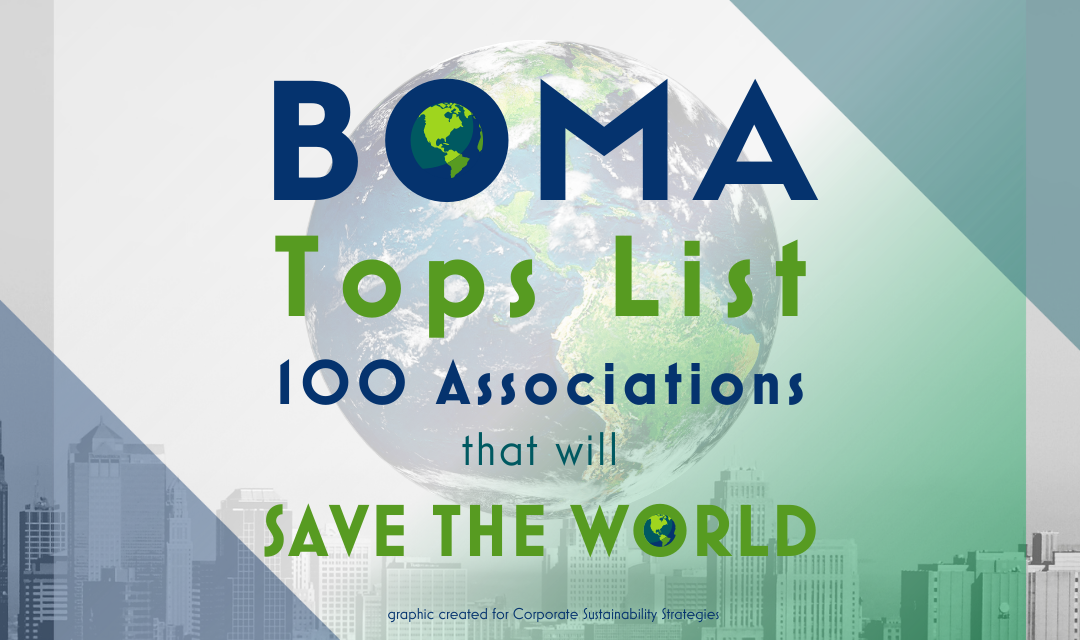
Aug 19, 2020 | Articles
Congratulations Building Owners and Managers Association (BOMA) International for being named one of the “100 Associations That Will Save the World” by the American Society of Associations Executives (ASAE).
BOMA was recognized for its outstanding sustainability work and is featured on as the top example for sustainability, which is attributed to BOMA’s W2 (Water and Waste) Challenge.
BOMA’s W2 Challenge
The W2 Challenge was a groundbreaking, two-year program designed to encourage buildings in the United States to benchmark water usage and waste output and implement best practices to improve performance.
The W2 Challenge focused on securing the largest and broadest participation as possible, wherein participants committed to enter water and/or waste data at least quarterly in ENERGY STAR Portfolio Manager® over the 2018 and 2019 calendar year. The challenge was open to all real estate sector properties, from commercial to residential to retail.
- More than 2,000 buildings participated the United States
- 412 cities were represented
- 493 million square feet of property were shared with the W2 Challenge in Portfolio Manager
BOMA’s Historic Pursuit of Improved Building Performance and Sustainability
Beginning in the mid-1990s, sustainability practices gained traction in building design and construction, and programs such as Green Globes, Leadership in Energy Efficient Design (LEED), and others aimed took aim at energy-efficiency standards for new construction.
However, there was a gap. Once construction was complete, what strategies could building operators and managers use to make older buildings more sustainable?
Recognizing this, BOMA filled the gap with education and comparability data that would enable building operators and managers to understand, implement, and improve strategies necessary to improve performance and increase energy efficiencies.
BOMA’s tireless pursuit of improving building performance and sustainability is evident in its many programs, which have also won awards from the Environmental Protection Agency (EPA) and have achieved the coveted ENERGY STAR Partner of the Year for Sustained Excellence.
*****
Visit ASAE for more information about BOMA & Sustainability: Benchmarks for W2 and Preserving ENERGY STAR as a Free and Voluntary Program and ASAE Research Foundation Case Study: BOMA Benchmarking in Pursuit of Sustainability.
Visit Facility Executives for more information about BOMA’s W2 Challenge and Champions.
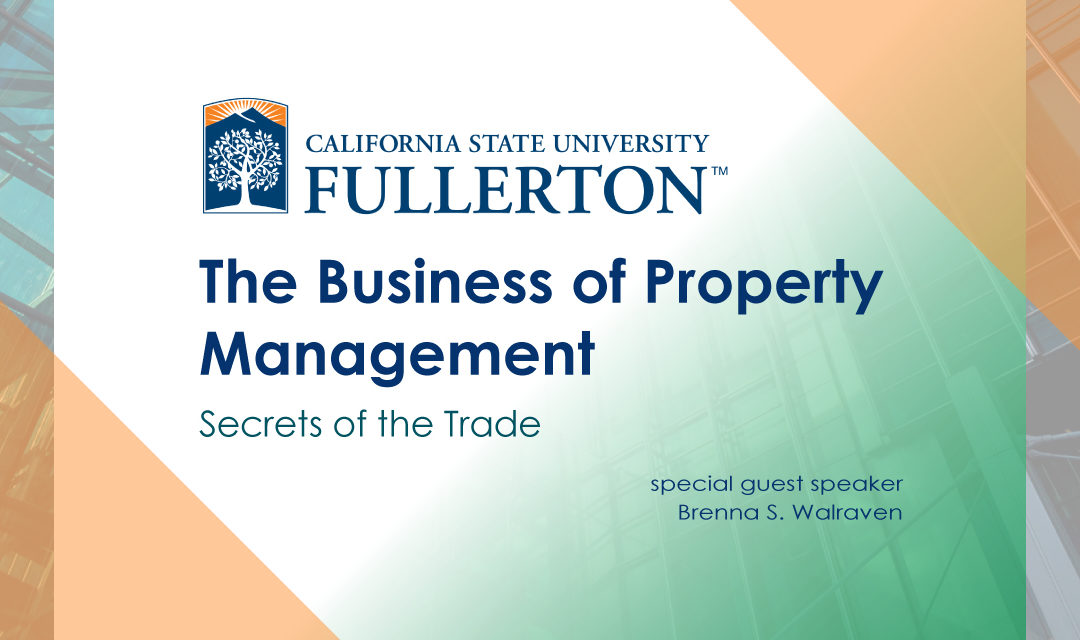
Feb 12, 2020 | Articles, Events, Homepage
The Property Management course gives a practical description of the “nuts and bolts” of the business of property management. You will learn the secrets of the trade and the value of professionalism and ethics that will assist you in maximizing the income to the owners, while protecting the asset and treating tenants fairly. Other topics covered in the course include tenant relations; landlord/tenant law; leasing/renting; office administration; insurance; financial statements/budgets; building maintenance; and property management as a career.
Course Description
CSUF: FIN 400 Property Management (online for CSUF students)
Brenna Walraven will shares Secrets of the Trade with CSUF students.
Agenda
- Property Management Introduction & Foundation
- What it takes to be in Property Management
- Skills needed
- Every day is different
- Customer Centric Approach
- Understand Ownership Objectives
- Examples of a “Day in the Life”
- How does a pandemic impact your property or portfolio?
- How does underwriting impact your job?
- New ways to add value in property operations
- Importance of Leadership
- Questions
Date and Time
April, 27, 2020
11:30AM-12:45PM
Location
Online for CSUF students
Class Contact
Jia Xie
Assistant Professor
Department of Finance
Mihaylo School of Business & Economics
California State University at Fullerton
more Information






